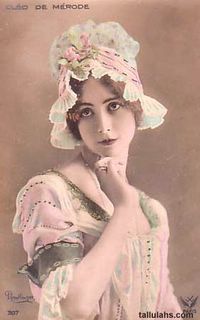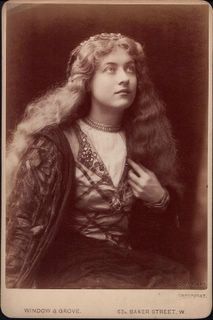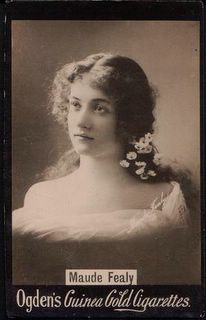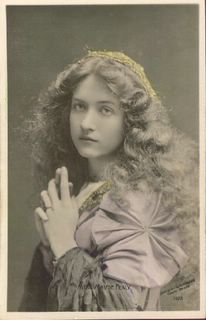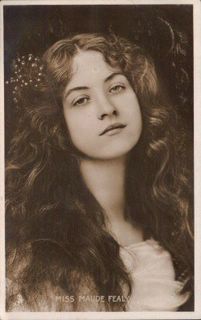 Maude Fealy(1883-1971)
Maude Fealy(1883-1971)
Biographical Notes: Maude Fealy was born Maude Hawk in Memphis, Tennessee on March 3, 1881 (one account says March 4, 1883), the daughter of Margaret Fealy (1866-1955), a stage and film actress who conducted an acting school at the time, and who later was in charge of the Tabor School of Acting in Denver, Colorado. At one time, Maude's mother was married to orchestra leader Rafaello Cavallo, who became Miss Fealy's stepfather.
Stage Appearances: At the age of three Maude made her first appearance on the stage, taking the part of an angel in an adaptation of Faust and Marguerite, in which her mother played Marguerite. When she was five years old, she took the part of little Willie in the great melodrama, East Lynne, and was also seen in the role of Meenie in Rip Van Winkle.
In 1906 she signed a five-year contract with John Cort, under whom her first appearance was in The Illusion of Beatrice, a comedy by Martha Morton. In 1907 Maude Fealy began the season in the role of Ernestine in The Truth Tellers, another play by Martha Morton, and ended it co-starring with William Collier in On the Quiet. By this time she was well known as an actress and was featured on magazine covers and other publicity. In 1907 and 1908 she was seen the leading role in The Stronger Sex, a play by John Valentine, which toured Western America and Canada. Another play, The Right Princess, staged by Maude Fealy and her husband, drew many enthusiastic reviews during the 1911-1912 season.
Wedding Bells: In 1901 the story made the rounds that Maude Fealy was engaged to be married in William Gillette, with whom she was acting on the English stage, and the story was printed in so many papers that her mother cabled denials to leading press agencies in the United States and England. The union never took place.
On July 15, 1907 Maude Fealy was secretly married to Lewis Hugo Sherwin, a young Englishman who was dramatic critic for the Denver Republican. The couple, fearful of what Maude's mother might say if she learned of the situation, lived apart for the first two weeks. Then, for a brief time, the newlyweds were together at her parents' home at 826 East Colfax Street in Denver. Maude's mother did not approve of the match, and referred to her new son-in-law as a "nobody." She did her best to split the couple apart. Her stepfather, Rafaello Cavallo, likewise viewed the union with disfavor and was quoted as saying that Sherwin did not earn enough money to keep Miss Fealy provided with gloves, or, for that matter, to buy his own cigars and pay his laundry bills.
Not surprisingly, a rift developed between Maude and her husband when her mother, stating that Maude was not ready for such a marriage, forced her husband to agree to live separately for a year, after which he moved to the East. Miss Fealy subsequently filed for divorce, giving desertion and non-support as the reason. The decree was granted on Saturday, September 25, 1909.
In Washington, D.C., on November 28, 1909 (one account says October 31, 1909), Maude Fealy married an actor who played juvenile leads with Keith's stock company, James Peter Durkin. Her new mate apparently won his mother-in-law's approval, for an article datelined St. Paul, Minnesota, December 15, 1909, and printed in The Kansas City Post, quoted him as saying: "I can assure you that the marriage took place with the entire approval of Maude's mother. We would never have been married without her sanction. We were married in Washington, we don't care to say where, when, or by whom. Marriage is too sacred to be talked about publicly."
Using Maude's financial resources, the couple later formed the Fealy-Durkin stock company, which performed plays in Denver and elsewhere. Sacred or otherwise, the Fealy-Durkin marriage ended in divorce in Denver on June 18, 1917. Subsequently, Maude Fealy made a third and final trip to the altar, to wed James E. Cort. The marriage ended in an annulment in 1923.
With Thanhouser: Maude Fealy appeared in several Thanhouser films in 1911 and 1912, and worked at the New Rochelle studio between stage engagements. She played occasional parts at the time and was not featured in Thanhouser publicity releases or advertisements.
In April 1913, following stage appearances in the road show of The Right Princess, she signed a three-year contract with Charles J. Hite to appear in Thanhouser films. She came to New Rochelle and spent seven weeks with the production company for the film, King Ren?s Daughter. Her husband, James Durkin, accompanied her and also secured a position with Thanhouser. Parts of June, July, and August were spent back in Denver, where she was on stage at the Lakeside Theatre at Elitch's Gardens.
Following the stage shows, Miss Fealy and her husband were scheduled to go back to New Rochelle. From there, she would "join the Thanhouser Company on an expedition to Nova Scotia, where Evangeline will be given a most elaborate production in the original locale of Longfellow's immortal book among 'the murmuring pines and hemlocks' of 'the forest primeval,'" according to a news item.
Shakespeare's The Winter's Tale and Tennyson's Elaine were also said to be scheduled. Although The Winter's Tale had been produced by Thanhouser in 1910, no 1913 version was ever made, nor did the New Rochelle firm ever release films under the titles of Evangeline or Elaine.
A New Rochelle city directory noted that Maude Fealy lived at Beacon Hall, an apartment building adjacent to the Thanhouser studios, in 1913. In 1914 Maude Fealy is not listed, but there is a listing for an Ellen Fealy at 150 Main Street. The New Rochelle Pioneer, October 10, 1914, described her home: "In private life she is Mrs. James Durkin, wife of a Thanhouser director, with whom she scored triumphs in stock on the legitimate stage, and their home is at Home Park, where, with her pets and plants, her art and books, she manages to find life anything but unpleasant. Miss Fealy is now taking a well earned rest from the screen, but those who have seen her work in the past know that there are other triumphs awaiting her."
She was treated with a queenly respect in Thanhouser publicity and in the trade press 1913-1914, due to her great renown on the stage earlier. Thanhouser films in which she played included Moths, The Legend of Provence, and Frou Frou. She also wrote several scenarios for Thanhouser films. Maude Fealy remained with Thanhouser through middle of summer 1914.
Her Career After Thanhouser: Variety, July 10, 1914, carried this item: "The withdrawal of James Durkin, director, and Maude Fealy, leading woman, from the ranks of the Thanhouser Film Co. comes as a big surprise to the movie world. Mr. Durkin and Miss Fealy are not deserting the pictures, but will, very likely, branch out with a new company of their own, featuring Miss Fealy. Ralph Cummings is slated as Durkin's successor with the Thanhouser." After leaving the Thanhouser Film Corporation, Miss Fealy went to Detroit, where she joined the Washington Theatre stock company, with whom she was seen on stage in August.
The Moving Picture World, October 16, 1915, stated that for Knickerbocker Star Features, Miss Fealy would appear in The Girl from Tim's Place, and, in blithe disregard for the facts, went on to inform readers: "Miss Fealy is a well-known figure with the legitimate stage, and The Girl from Tim's Place marks her initial appearance before the moving picture public."
In early 1916 she was a headliner on stage at Proctor's Theatre in Mount Vernon, New York, in a playlet, When the Tide Turned. Miss Fealy appeared in The Immortal Flame, released by Ivan Film in March 1916, possibly the film that was being produced at the Path?studios as described above. In December 1916 she joined the Jesse Lasky Picture Company to star with Theodore Roberts in a feature film for the Paramount program. She remained with Lasky in 1917.
The October 1916 Motion Picture News Studio Directory noted that Miss Fealy was 5'1" tall, weighed 110 pounds, and had brown hair and dark blue eyes. At the time she lived at 206 West 52nd Street, New York City, and her pastime diversions included swimming and writing. She spoke German and French in addition to her native language.
By early June 1917, Maude Fealy assembled a company of stage players for work on the stage at the Lakeside Theatre in Denver, where such productions as Sauce for the Goose, Her Own Money, Baby Mine, and a four-act play from her own pen, Shadow Lights, were staged. On September 1, 1918, The Little Teacher, a comedy drama, opened at the Grand Theatre in Kansas City, with Miss Fealy as the star. Later, the production traveled to the West Coast. In the 1920s she was on stage in numerous plays, including the 1928 Chicago productions at the National Theatre of Dancing Mothers and Madame X.
In the 1930s she was involved in the Los Angeles Federal Theatre Project, where she became the center of a bitter controversy (the nature of which was not disclosed in articles preserved in the Robinson Locke Collection and consulted for the present biography) and was demoted to a job in the sewing division of the Works Progress Administration. During the same decade she was seen in such films as Laugh and Get Rich, The Buccaneer, and Southern Pacific. In the early 1940s, Maude Fealy returned to Denver, where she taught dramatics. Later, she moved to California and opened a dramatic studio in Hollywood. Among her students were Edwina Booth and Nanette Fabray. In 1954 her stepfather retired. He was hospitalized in Pueblo, Colorado, and later died after a prolonged illness. Her mother passed away in 1955.
Maude Fealy remained in films for many years and had parts in many Cecil B. DeMille pictures during the sound era, including the 1956 release of The Ten Commandments, for which she also provided voices which were dubbed in the sound track for other players. She and DeMille were fast friends, having met years earlier shortly after the actress' first engagement at the Lakeside Theatre in Denver, where Fealy and DeMille engaged in a swordfight in a play, Dorothy Vernon of Haddon Hall. In 1957, she came back to Denver to retire, but it was not long until she was on the stage again in Colorado, also giving a lecture series at Loretto Heights College. She last appeared in a dramatic role on stage in 1961, in a production which concerned the life of Emily Griffith, a well-known Denver educator. In the same year, she told a reporter: "Actors never give up acting; it gives them up." At one time in the 1960s she lived in Denver at the Paramount Apartments at 30 East 14th Avenue.
Maude Fealy died in her sleep on November 9, 1971 in Woodland Hills, California. Prior to her passing, she had been hospitalized with arteriosclerosis at the Motion Picture Country House and Hospital. Funeral services were held at 11:30 a.m., November 12th, at Pierce's Hollywood Chapel, 5959 Santa Monica Boulevard, Hollywood. She was interred in the Hollywood Memorial Park Cemetery Mausoleum, close by her mother's remains. The expenses were provided for by a provision in the will of Cecil B. DeMille (who had died in 1959). No close relatives survived her.

